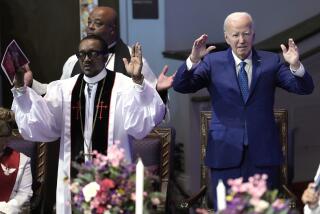Contenders From Mainstream Faiths : Religion: Statistics give Bush, an Episcopalian, the best chance, followed by Perot, a Presbyterian. Only 2 Presidents have been Southern Baptists, Clintonâs denomination.
NEW YORK â The main contenders for the U.S. presidency are products of three historically rooted Christian traditions--Baptist, Presbyterian and Episcopalian.
If past denominational trends carry any weight, President Bush has the best shot at it. Bush is the 12th Episcopalian President. Thatâs more than any other denomination, even though the Episcopal Church is the seventh largest in the country.
Although such statistical measures or denominational affiliations donât seem to have any clear impact in national elections, polls repeatedly show that most American voters want a believer in the White House.
Theyâve got that in the present three principal candidates, Democrat Bill Clinton, a Southern Baptist; independent Ross Perot, a Presbyterian, and Republican Bush.
If denominational connections count for anything in winning the top office, Presbyterians have the second-best track record--six of the past 40 Presidents.
Perot was reared a Methodist, but he and his family have been members of the 6,000-member Highland Park Presbyterian Church in Dallas for about 25 years.
âWhenever heâs in town, he comes to church very faithfully,â said the senior pastor, the Rev. B. Clayton Bell. âHe has a basic Christian faith, very much middle-of-the-road Presbyterian.â
As a member, he has taken the church vows that include âfaith in Jesus Christ as Savior and Lord and a willingness to live by the disciplines of the Scripture and the church.â
As a Southern Baptist, Clintonâs denomination of 15.2 million is the largest Protestant body in the country. Only two previous Presidents have been members--Harry Truman and Jimmy Carter.
Clinton belongs to Immanuel Baptist Church, a prominent congregation in Little Rock. While there, he attends services nearly every Sunday and sometimes sings in the choir.
The Rev. Brian L. Harbour, pastor there until 1990, said Clinton was âvery faithful in his attendance.â
In a recent interview on VISN, an interreligious faith and values cable channel, Clinton said:
âMy faith tells me that all of us are sinners, and each of us has gone in our own way and fallen short of the glory of God. Religious faith has permitted me to believe in my continuing possibility of becoming a better person every day.
âIf I didnât believe in God, if I werenât . . . a Christian, if I didnât believe ultimately in the perfection of life after death, my life would have been much more difficult.â
Clinton says he has been saddened and hurt by the controversy in the prolonged Southern Baptist struggle in which moderates have been pushed to the sidelines by a controlling administration of biblical fundamentalists.
He classified himself among moderates, who stress the historic Baptist principle of âsoul libertyâ of the individual to interpret Scripture as each understands it.
Bush, a longtime member of St. Martinâs Episcopal Church in Houston, attends various churches in Washington and elsewhere, and is a close friend of evangelist Billy Graham.
Their families usually spend some vacation time together at the Bush summer home at Kennebunkport, Me.
He has said that faith was a âgivenâ in his family. âGod just was. There was no debate about it.â
Bush has courted evangelical conservatives in the campaign, speaking and being cheered at their rallies. In a speech last spring to the National Religious Broadcasters, he said: âI believe one canât be President of America without a belief in God and in prayer.â
Membership in his denomination, the Episcopal Church, is about 2.5 million. The Presbyterian Church (U.S.A.) has about 3.8 million members.
More to Read
Sign up for Essential California
The most important California stories and recommendations in your inbox every morning.
You may occasionally receive promotional content from the Los Angeles Times.










